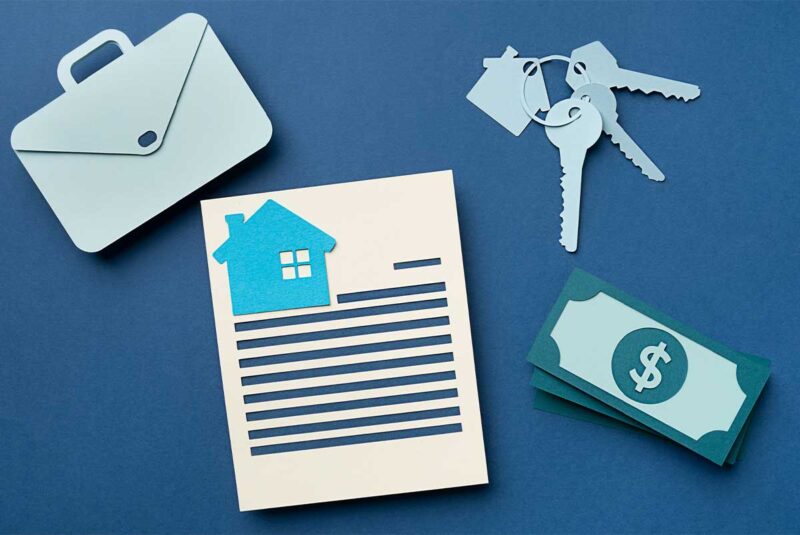Ready To Buy a Home?
Get Approved to Buy a Home
Rocket Mortgage® lets you get to house hunting sooner.
For most home buyers, there’s no buying a house without getting a mortgage – and there’s no getting a mortgage without getting a mortgage lender. Think of mortgage lenders as the gatekeepers to homeownership.
If you pay with cash, you can skip right past the lender. But if you’re like the rest of us – read on.
First things first: Don’t fear the gatekeeper.
The person handling your mortgage application will be motivated to help you buy a home. Maybe they enjoy helping borrowers’ dreams come true, or maybe they’re just determined to close a deal. (Spoiler alert: Most lenders have both mindsets.)
A lender can help you:
- Understand the loan options you currently qualify for.
- Spot areas of your finances to improve to help you get your preferred loan type and better loan terms.
- Handle the mortgage application and approval process.
Mortgage lenders should compete for your business. Buying a home is a big investment in money, time and emotions.
Understanding Different Types of Mortgage Lenders
Figuring out where to get a mortgage can be confusing, especially if you’re a first-time home buyer. Let’s simplify things with a breakdown of the different types of mortgage lenders you may encounter. Three types of mortgage lenders are retail lenders, direct lenders and online lenders.
Retail lenders
Retail lenders loan money directly to consumers, which cuts out the need for a third party. Common examples of retail lenders are banks, credit unions and other financial institutions.
Direct lenders
Rather than focus on a broad range of financial products like traditional banks, direct lenders specialize in mortgages. Direct lenders are commonly referred to as mortgage banks. While their product offering may be limited, they may offer more flexible loan approval standards.
Online lenders
Online lenders are the new kids on the block. They make the mortgage process easy and convenient. In many cases, the entire process can be completed online. Most online lenders are retail-focused lenders.
Learning About Loan Types
Knowing the different mortgage loan types and understanding them is the foundation of any happy home purchase. For example, selecting between a fixed-rate mortgage and an adjustable-rate mortgage (ARM) can have a major impact on your future monthly mortgage payment.
School yourself on loan types before you speak to a lender so you can have a more productive conversation right off the bat.
Types of mortgage loans
- Conventional loan: A relatively low-cost loan with a higher credit score and DTI requirement than government-backed loans. A conventional loan is one of the most common types of mortgage.
- Federal Housing Administration (FHA) loan: An FHA loan is a government-backed loan that’s popular with first-time home buyers and buyers with lower credit scores.
- Department of Veterans Affairs (VA) loan: A VA loan is a government-backed loan that offers friendly terms, low interest rates and no down payments to qualifying active-duty service members, veterans and their surviving spouses.
- Jumbo loan: Jumbo loans finance home purchases that cost more than the mandated loan limits for conventional or FHA mortgages. Jumbo loans have higher credit and income requirements than conventional loans, and they are not backed by Fannie Mae or Freddie Mac.
There are also loan programs available to home buyers who may need closing cost or down payment assistance. The programs, which are usually offered by state and local governments and nonprofits, usually target low- to moderate-income first-time home buyers.
Questions To Ask a Mortgage Lender
There are so many different mortgage providers to choose from, which is why you should compare multiple lenders before making a final decision. To find the best lender for you, you’ll need to compare the interest rates, fees and monthly mortgage payments they offer.
And when you’re ready to sit down with a lender, keep these essential questions in mind:
Which mortgages do you offer?
Not every lender offers the same mortgage loans. While most lenders offer conventional mortgages, not all lenders offer FHA, VA or jumbo loans.
What mortgage terms do you offer?
Depending on the type of mortgage, lenders may offer different loan terms, including the length of the loan or whether the loan will be a fixed-rate or adjustable-rate loan.
Make sure to ask about any down payment requirements, including what size down payment you’ll need to make to avoid mortgage insurance.
What interest rates and APR do you offer?
Your interest rate is what your lender charges you to borrow money. Your annual percentage rate (APR) is your annual cost to borrow. What’s the difference? If Lender A and Lender B offer the same interest rate but Lender B charges a higher APR, Lender B’s loan likely includes more fees and other expenses that can add to the cost of the loan.
You may also want to ask the lender if they offer mortgage discount points so you can get a lower interest rate.
What would my fees and closing costs be?
While certain aspects of your mortgage will be standardized, every lender handles fees and particular mortgage costs differently. A good way to compare lenders is by asking them how much they usually charge for closing costs and gauging if there is any room for negotiation. Average closing costs are in the 3% range.
Do you offer mortgage rate locks?
Because interest rates can change, the super-low interest rates a lender quotes one day may not be available a week later. A mortgage rate lock guarantees your quoted rate will stay the same for a set time. But a rate lock doesn’t guarantee the frozen interest rate will be your final interest rate. Your lender does reserve the right to adjust your loan rate based on their final review of your finances and the terms of your loan.
You may also want to ask whether the lender is open to negotiating or waiving fees or if they can fold fees into the mortgage.
Who will service my mortgage?
Your mortgage lender will handle everything up through closing. After closing, they may service your loan or outsource the servicing of your mortgage. Mortgage servicing involves collecting your monthly mortgage payment, disbursing payments to your lender and local tax authorities and providing customer service. If a lender doesn’t service their mortgages, ask who they use, especially if you’re concerned about the level of customer service you might receive.
Review Your Finances
Besides reviewing your credit report and bank statements to gauge your financial readiness, you should ask yourself a few questions:
- What’s my house buying budget?
- How long do I plan to live in the house?
- What kind of home am I looking for? Do I want a primary residence, a vacation home, a single-family home, a mobile home or even a tiny home?
Your answers can help you focus your search on lenders who can handle the specifics of your home purchase type.
Steps To Find the Best Mortgage Lender for You
Now that you have a clearer view of the mortgage landscape, your options and your finances, it’s time to track down the lender that’s going to help you move into your new home.
Maybe you need a mortgage lender that specializes in jumbo loans. Or maybe you need a lender that’ll finance a tiny house. (Most mortgage lenders won’t, but some personal loan lenders will.)
Keeping the specifics of your situation in mind can help you quickly filter through loan options.
Generally, it is a good idea to have a few mortgage lenders in mind at least 1 month before you are ready to make an offer on a home. Even if you are on a shorter mortgage timeline, you will have plenty of options.
1. Shopping for mortgage lenders
Comparing lenders should start with a quick online search or by asking your real estate agent for recommendations. To learn more about each lender:
- Compare lender mortgage rates (usually published in rate tables on their websites).
- Review their loan fees and any fine print about interest rates (transparency FTW!).
- Compare their online reviews (try Google and the Better Business Bureau®).
- Find out what loan types they specialize in.
- Read their bios. Are they experienced? Are they giving people-person, down-to-earth vibes? Or do they seem too eager to tout their certifications and success?
2. Get preapproved for a mortgage
Mortgage preapprovals come with two major benefits. The first benefit is that you can use preapprovals to compare lenders.
Compared to the numbers on a lender’s website or what they’ve estimated, lender preapproval offers a more accurate estimate of interest rates, fees and monthly mortgage payments.
Many home buyers choose to negotiate with their favorite lender at this point if they think they can get a better deal on loan terms. Multiple preapproval quotes give you the leverage to negotiate.
And the second benefit? With a preapproval in hand, sellers know there are lenders out there willing to give you a loan.
3. Choose a lender based on your qualifications
The lender that makes the most sense for you will depend on your credit score and finances. If you have a high credit score and low debt-to-income (DTI) ratio, the chances of getting a mortgage with a lower interest rate are greater. The right lender for you will fit your current financial profile.
4. Negotiate with lenders
So let’s be real. Negotiating doesn’t come easy for everyone. Some of us don’t have the time or the confidence – or it just makes us uncomfortable. If that’s you, hiring a mortgage broker or recruiting your real estate agent to negotiate rates might be a good option.
Mortgage Lenders: The Heroes of Home Buying
Don’t settle on a lender. Choose a lender that champions your cause. A great lender can make your dream of owning a home a reality with loan terms that are ideal for you.
Knowing where to look for a mortgage and following our steps can help you find a lender that will make your home buying experience as enjoyable – and wallet-friendly – as possible.
Get approved to buy a home.
Rocket Mortgage® lets you get to house hunting sooner.
The Short Version
- The most popular types of mortgage lenders are retail lenders, direct lenders and online lenders
- To find the best lender for you, you’ll need to compare the variety of mortgage options, interest rates, fees and monthly payments they offer
- Generally, it is a good idea to have a few mortgage lenders in mind at least 1 month before you are ready to make an offer on a home




